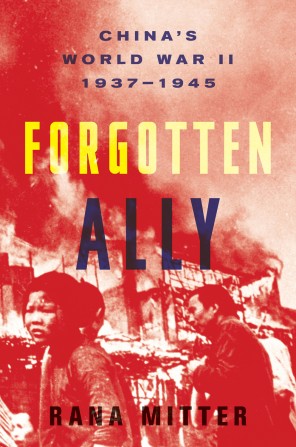 Rana Mitter has his premise exactly correct. The 1937-1945 war in China is largely unknown and not long remembered. In 1943, Allied leaders decided that the campaign in China was second tier in their long-term plan to defeat the Axis Powers—Germany, Italy, Japan, and other minor players. Yet the Sino-Japanese war was critical to our final victory over Japan. In all, approximately four-million Japanese troops were tied-down in the Kwangtung Army’s China campaign. In the last chapter of this detailed tome, Mitter avers that if China had capitulated in 1938, as was a serious possibility, Japan’s imperial ambitions would have been significantly enhanced. A pacified China would have encouraged Japan to invade British India and made their victory much easier.
Rana Mitter has his premise exactly correct. The 1937-1945 war in China is largely unknown and not long remembered. In 1943, Allied leaders decided that the campaign in China was second tier in their long-term plan to defeat the Axis Powers—Germany, Italy, Japan, and other minor players. Yet the Sino-Japanese war was critical to our final victory over Japan. In all, approximately four-million Japanese troops were tied-down in the Kwangtung Army’s China campaign. In the last chapter of this detailed tome, Mitter avers that if China had capitulated in 1938, as was a serious possibility, Japan’s imperial ambitions would have been significantly enhanced. A pacified China would have encouraged Japan to invade British India and made their victory much easier.
Actually, the war in China began in 1931 when Japan’s Kwangtung Army seized China’s northeaster province Manchuria and set up a puppet government under the last Qing Emperor, Aisin-Gioro Puyi.
This book gives short shrift to the details of the war in China. The war is but the stage for Mitter to detail the political machinations between the various players: personalities and governments. In all, it was the iron determination of Chiang Kai-shek, President of the Republic of China that kept China in the war—twenty million casualties and 500 million displaced persons.
President Roosevelt appointed General Joseph (“Vinegar Joe”) Stillwell as Chiang’s Chief of Staff. In effect, Stillwell was the commander in chief of the Chinese army. Unfortunately, the misunderstanding between Chiang and Stillwell morphed into vitriolic hatred that seriously hampered China’s war effort. Chiang had to acquiesce to Stillwell’s authority because he desperately needed what help the USA was sending—initially over the Burma Road. After Burma fell to the Japanese, Army Air Corps transport aircraft, based in India, flew over the Himalayas (“The Hump”) into Chunking.
Except for a few offensive strikes, China’s –man army fought a defensive war. The notable was Stilwell’s disastrous 1943 campaign to recapture Burma with Allied troops—the vast majority was Chinese (“Chindits).
Of significance, Mitter almost ignores the American Volunteer Group (The Flying Tigers)—three squadrons of Curtiss P-40 aircraft operating in Burma and southern China and their outstanding victories over the Japanese’s Army aircraft.
This book is not an easy read. It is more of a reference book for those deeply interested in the politics of China during the war years.